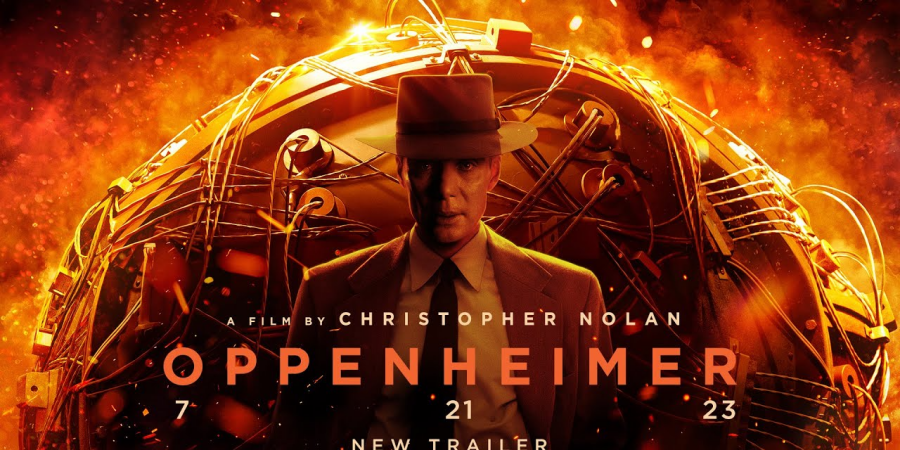

"Oppenheimer" is a compelling portrayal of one of the most enigmatic figures of the 20th century, J. Robert Oppenheimer, the father of the atomic bomb. Directed by Christopher Nolan, this biographical drama delves deep into Oppenheimer's complex psyche, exploring the moral dilemmas and personal sacrifices that shaped his pivotal role in the development of nuclear weapons during World War II.
At the heart of the film is Cillian Murphy's mesmerizing performance as Oppenheimer. Murphy masterfully captures the physicist's intellectual brilliance, inner turmoil, and eventual remorse, delivering a nuanced portrayal that humanizes a figure often shrouded in controversy. From Oppenheimer's early days as a theoretical physicist to his leadership of the Manhattan Project, Murphy's portrayal is both captivating and haunting, revealing the inner conflicts of a man torn between duty and conscience.
Nolan's direction is as ambitious as ever, weaving together multiple timelines and perspectives to create a kaleidoscopic portrait of Oppenheimer's life. The film skillfully juxtaposes Oppenheimer's scientific achievements with the ethical implications of his work, raising profound questions about the nature of progress and the cost of scientific advancement. Through breathtaking cinematography and immersive sound design, Nolan transports audiences to the clandestine world of the Manhattan Project, capturing both the awe-inspiring beauty and the existential dread of the atomic age.
The supporting cast, including Emily Blunt as Oppenheimer's wife Kitty and Tom Hardy as fellow physicist Edward Teller, delivers standout performances that enrich the film's emotional depth. Blunt brings a quiet strength to Kitty, portraying her as Oppenheimer's steadfast confidante and moral compass. Hardy imbues Teller with a complex mix of ambition and remorse, highlighting the ethical ambiguity of the scientific community's race to harness atomic power.
"Oppenheimer" is not merely a biopic but a profound meditation on the human condition, exploring themes of power, responsibility, and redemption. Through Oppenheimer's journey, Nolan invites audiences to confront the moral complexities of scientific progress and the enduring legacy of the atomic age. With its arresting visuals, powerhouse performances, and thought-provoking narrative, "Oppenheimer" is a cinematic tour de force that lingers in the mind long after the credits roll."Oppenheimer" emerges as a cinematic marvel, a narrative mosaic skillfully crafted by Christopher Nolan that not only chronicles the life of J. Robert Oppenheimer but also serves as a profound reflection on humanity's quest for knowledge and the unforeseen consequences that often accompany it.
At the film's core lies Cillian Murphy's portrayal of Oppenheimer, a mesmerizing blend of intellect, passion, and inner turmoil. Murphy's performance transcends mere mimicry, delving into the psyche of a man grappling with the weight of his own creations. Through subtle gestures and piercing gazes, Murphy captures Oppenheimer's moral ambiguity, transforming him from a historical figure into a multidimensional character whose complexities resonate with audiences long after the credits roll.
Nolan's direction elevates "Oppenheimer" to cinematic poetry, weaving together past and present, reality and memory, in a mesmerizing tapestry of visuals and sound. The film's non-linear narrative mirrors Oppenheimer's own fractured psyche, inviting viewers to navigate the labyrinth of his thoughts and emotions. With each frame meticulously composed and each scene meticulously crafted, Nolan invites audiences on a journey of introspection, challenging them to confront the ethical dilemmas that lie at the heart of scientific progress.
But it's not just Murphy who shines in "Oppenheimer." Emily Blunt delivers a powerhouse performance as Kitty Oppenheimer, infusing the character with grace and resilience in the face of uncertainty. Tom Hardy dazzles as Edward Teller, capturing the complexity of a man driven by ambition yet haunted by his own demons. Together, they form a formidable ensemble, each actor bringing depth and nuance to their respective roles, enriching the film's emotional tapestry.
"Oppenheimer" is more than a biopic; it's a philosophical inquiry into the nature of knowledge and the pursuit of power. Through Oppenheimer's journey, Nolan raises profound questions about the ethical responsibilities of scientists and the enduring legacy of their discoveries. As Oppenheimer grapples with the consequences of his actions, audiences are compelled to confront their own complicity in the march of progress, forcing them to reckon with the moral complexities of the atomic age
